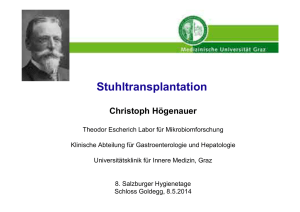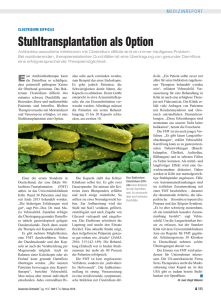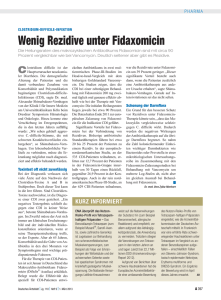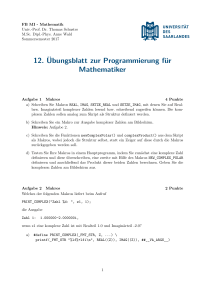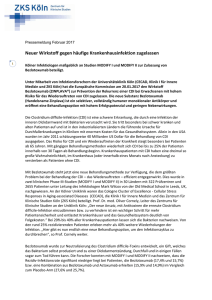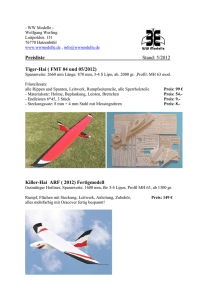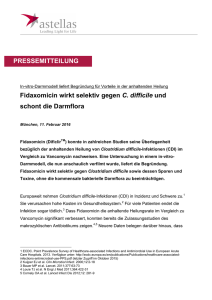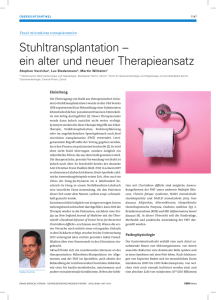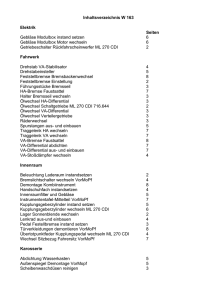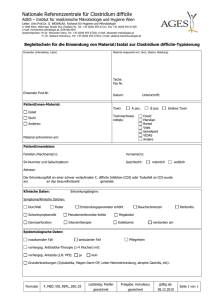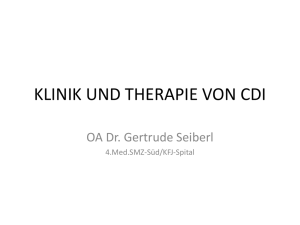Pro - PEG-Symposien
Werbung
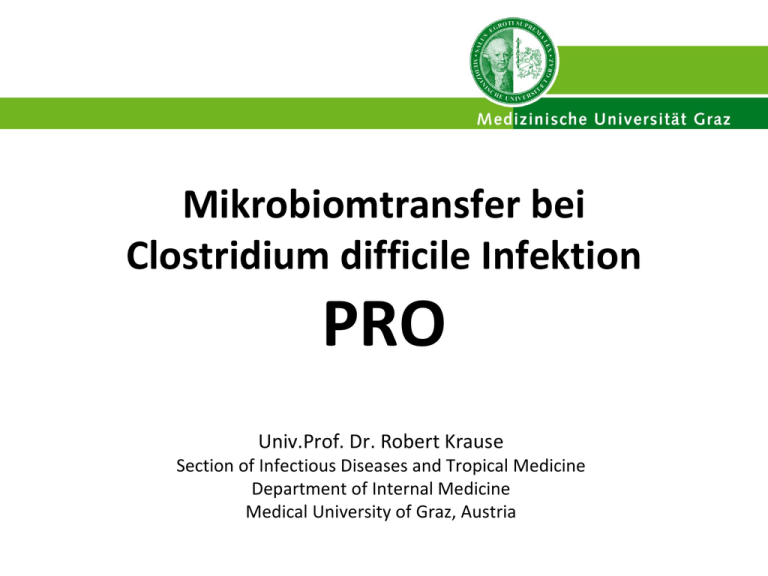
Mikrobiomtransfer bei Clostridium difficile Infektion PRO Univ.Prof. Dr. Robert Krause Section of Infectious Diseases and Tropical Medicine Department of Internal Medicine Medical University of Graz, Austria Mikrobiomtransfer = fäkale Mikrobiota Transplantation FMT • Definition: Übertragung von Stuhl (und damit Stuhlbakterien u.a.) eines Gesunden in den Darm eines Erkrankten • Ziel: Wiederherstellung eines gestörten intestinalen Mikrobioms Zhang. Am J Gastro 2012 FMT • CDAD • Colitis ulcerosa • Intestinale Dysbiose mit GI Trakt Funktionsstörung bei ICU Patienten PRO FMT • Indikation – Studien – Leitlinien • Sicherheit und Nebenwirkungen • Standardisierbarkeit – Spender, Stuhlverarbeitung, Lagerung, Applikationsroute • Verfügbarkeit • Legistische Überlegungen – Österr. Leitlinie, AGES • Akzeptanz/Erwartungshaltungen der Patienten C. Diff Therapie • Metronidazol – „mild-to-moderate CDI“ • Keine Resistenzinduktion • Billiger als Vanco • Vancomycin – „severe CDI“ • Besser als Metronidazol (Heilungsrate, Komplikationen etc) • Teicoplanin – „severe CDI“ • Besser als Metronidazol (Heilungsrate, Komplikationen etc) • Fidaxomicin – „severe CDI“ und Risiko für Rezidiv • Rifaximin – Folgetherapie nach Vanco bei Rezidiven • • • • Keine Studie zur Primärtherapie Resistenzinduktion „Primärresistenz“ 8% (Lit 2) Kreuzresistenz zu Rifampicin (Lit 4,5) Zar. CID 2007;45:302–7 Goldstein AAC 2011;55:5194–5199 Debast. Clin Microbiol Infect. 2013 Oct 5. doi: 10.1111/1469-0691.12418 Valentin. J of Infection 2011;62, 34e38 Krause NEJM 2011; 364:1467-1468 C. diff. Therapie • Bis 25% Therapieversagen bei Erst-Therapie • 40% Therapieversagen beim ersten Rezidiv (Vanco) • 70% Therapieversagen bei mehrfachen Rezidiven • FMT Els van Nood et al. NEJM 2013;368:407 Clinical Studies FMT for recurrent CDI Borody TJ et al Gastroenterol Clin N Am 2012; 41: 781–803 Clinical Studies FMT for recurrent CDI Borody TJ et al Gastroenterol Clin N Am 2012; 41: 781–803 Clinical Studies FMT for recurrent CDI Van Nood. NEJM 2013;368:407 Borody TJ et al Gastroenterol Clin N Am 41 (2012) 781–803 Vielfalt (Diversität) Els van Nood et al. NEJM 2013;368:407 FMT bei C. diff Infektion ESMID guideline 2014 more than one relapse Debast. Clin Microbiol Infect. 2013 Oct 5. doi: 10.1111/1469-0691.12418. Indications for FMT • Recurrent or relapsing CDI – Three or more episodes of mild to moderate CDI and failure of a 6- to 8-week taper with vancomycin with or without alternative antibiotic agents. – At least 2 episodes of CDI that result in hospitalization and are associated with significant morbidity. Moore. CID 2014;58(4):541–5 Indications for FMT • Recurrent or relapsing CDI – Three or more episodes of mild to moderate CDI and failure of a 6- to 8-week taper with vancomycin with or without alternative antibiotic agents. – At least 2 episodes of CDI that result in hospitalization and are associated with significant morbidity. • Moderate CDI not responding to standard therapy (vancomycin or fidaxomicin) for at least 1 week. • Severe (and perhaps even fulminant CDI) with no response to standard therapy after 48 hours. Moore. CID 2014;58(4):541–5 Sicherheit/Nebenwirkungen 1xHarnwegsinfekt, 1x ohne Keim/Fokus 1xCholedocholithiasis, ERCP vanNood. N Engl J Med 2013;368:407-15. Sicherheit und Nebenwirkungen • Symptome IBS (6 von 317) • 13 Todesfälle (4% of 317) während des follow up – CDI oder durch Grunderkrankung • 1 Tod durch Pneumonie (FMT durch Nasogastralsonde, Aas et al. CID 2003) • Tod durch V.a. Magensondenfehllage, akutes Abdomen • Fieber (V.a. bei Applikation in den oberen GI Takt bei IBD) • 4 of 70 Pat. mit Autoimmunerkrankungen bei Langzeit - follow up • 2 Todefälle von 80 immuspprimierten FMT Patienten, 1 wg Aspiration während Coloskopie und Sedierung, 1 ohne Zusammenhang Gough E et al. Clin Inf Dis 2011; 53:554 Borody TJ et al Gastroenterol Clin N Am 2012; 41: 781–803 Brandt LS et al. Am J Gastro 2012;107:1079 Högenauer, Kump. Krause. Clin Infect Dis. 2014;59:1348-1349 Solari. Clin Infect Dis. 2014 Jul 15;59:319 Kelly. Am J Gastroenterol 2014; 109:1065–1071 FMT rechtliche Situation • Erstellung einer österr. Leitlinie und Mitarbeit/Akzeptanz durch AGES/BM für Gesundheit Kump. Clin Microbiol Infect 2014; 20: 1106–1111 Kump. Z Gastroenterol 2014; 52: 1485–1492 Durchführung FMT • Standardisierbarkeit – Leitlinien – Spenderauswahl, Spenderuntersuchungen – Stuhlvorbereitung, FMT Zubereitung – Lagerung – Applikation Kump. Clin Microbiol Infect 2014; 20: 1106–1111 Kump. Z Gastroenterol 2014; 52: 1485–1492 Durchführung FMT • Verfügbarkeit – Akutspender • Gescreent • im Notfall nicht-gescreente Spender – gelagerte Stuhlsuspensionen – Verkapselter Stuhl FMT – Methode Klinische Ergebnisse Applikationsform •koloskopische FMT/Einlauf: 91,4% – Rechtes Colon: 94% – Linkes Colon: 83% •Nasogastral/jejunal-Sonde : 82,3% Kein head to head Vergleich – Magen: 81% – Jejunum 86% Art des Spenders •Verwandter/Partner/enger Freund: 89,5% •Anonym: 90,7% ? Kassam Z. et al. Am J Gastro 2013; 108:500-508 Cammarota G et al. J Clin Gastroenterol. 2014 Jan 16. Borody. Curr Gastroenterol Rep (2013) 15:337 Frozen FMT • 20 patients (median age, 64.5 years; range, 11-89 years) • C diff disease, one of – ≥ 3 episodes of mild to moderate C difficile infection and failure of a 6- to 8-week taper with vancomycin – ≥ 2 episodes of severe C difficile infection requiring hospitalization • Unrelated donors • 15 capsules on 2 consecutive days • follow up for symptom resolution and adverse events for up to 6 months. Youngster. Jama 2014. doi:10.1001/jama.2014.13875 Frozen FMT • • • • Mean 48g stool Prepared with glycerol Pipetted in 30 capsules Stored -80°C – mean of 113 days (range, 30-252 days) prior to administration • CDI treatment stopped 48h prior to FMT Youngster. Jama 2014. doi:10.1001/jama.2014.13875 Frozen FMT • Resolution of diarrhea in 14 patients (70%; 95% CI, 47%-85%) after one capsule-based FMT • All 6 non-responders retreated – 4 had resolution of diarrhea • resulting in an overall 90% (95% CI, 68%-98%) rate of clinical resolution of diarrhea (18/20) Youngster. Jama 2014. doi:10.1001/jama.2014.13875 Akzeptanz/Erwartungshaltung der Patienten • 192 Patienten befragt zur potentieller FMT • Bei 94% akzeptiert, wenn vom Arzt vorgeschlagen • Tablette bevorzugt 90% • FMT unattraktiv, wenn verabreicht über Nasogastralsonde • 77% würden für FMT bezahlen Zipursky. CID. 2012;55(12):1652–8

